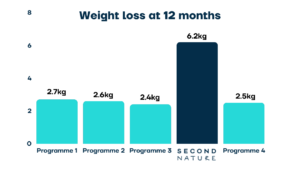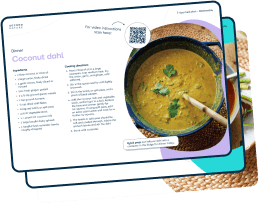No, you don’t need to count calories or use a calorie counter to lose weight.
Nutrition
Do you need to count calories to lose weight?
Written by
Robbie Puddick (RNutr)
Content and SEO Lead
Medically reviewed by
Dr Rachel Hall (MBCHB)
Principal Doctor
5 min read
Last updated February 2026

Medication-assisted weight loss with a future focus
Start with Wegovy or Mounjaro, transition to habit-based health with our support


Here are seven reasons why:
- We’re terrible estimators of our calorie intake.
- All sources of calories aren’t created equal.
- Our energy expenditure is fluid.
- How many calories you eat isn’t necessarily how many calories you’ll absorb.
- Food labels are inaccurate.
- It’s tedious and time-consuming.
- There’s good evidence that you can lose more weight without counting calories.
Good evidence shows that you can lose weight without counting calories if you have access to other tools, like mindful eating and learning about hunger and nutrition.
Counting calories is a tool that some people may use to help them control their portion size and learn about different foods and how they differ in energy content.
Many people compare counting calories to a budget for your money. No one would criticise someone for using a spreadsheet and having a budget for their money, so why shouldn’t we approach food in the same way?
This is a compelling argument, but food and money aren’t the same things, and our relationship with food is very different to our relationship with money.
At Second Nature, we don’t count calories or macronutrients or ask you to follow strict rules to help you lose weight, and we have scientific evidence to back up our approach.
In 2022, the NHS published research in the BMJ that compared the weight loss outcomes of five providers in the National Diabetes Prevention Programme.
Second Nature was more than twice as effective at supporting weight loss than the other four providers.

If you’d like the support of a registered dietitian and nutritionist and join over 150,000 people who’ve lost weight and kept it off without counting a single calorie, click here to take our health quiz.
Otherwise, keep reading as we analyse seven reasons you don’t need to count calories to lose weight.
Seven reasons why you don’t need to count calories to lose weight
1) We’re terrible estimators of our calorie intake
Unfortunately, humans are very poor estimators of the number of calories we eat. Research has shown that we can underestimate the calorie content of foods by up to 16%.
Other studies evaluating the effectiveness of food diaries have also shown that people may omit up to 9% of the food they consume. Over time, these inaccuracies will likely have a negative impact on your progress.
These studies suggest that we’re not only poor estimators of the calorie content of foods. As humans, we’re also prone to error and are likely to miss our snacks or fundamental elements of our meals.
While you might be doing your best to track what you’re eating to ensure you’re in a calorie deficit, you’re likely underestimating how much you’re eating.
You may also be omitting entire snacks rich in refined carbs or elements of your meals that contribute to your total energy intake.
2) All sources of calories aren’t created equal
From a technical perspective, all calories are the same as a calorie is just a measurement of energy.
But the sources of these calories will determine how they impact your body, and counting calories may distract you from the more important point about food: food quality.
If you consume 200 calories from a McDonald’s cheeseburger or 200 calories from an egg and avocado on sourdough toast, your body will respond very differently.
One will leave you feeling full, satisfied, and well-nourished and help you lose body fat – the other will likely leave you feeling lethargic, increase your cravings, and hungry and is strongly associated with obesity.
So, the tools we use to measure the energy density of foods (calories) don’t help us to understand how our body will respond to different sources of calories.
We’re complex biological systems, and it’s essential to learn about the different properties of whole foods and how your body responds to them.
3) Our energy expenditure is fluid
Our activity levels constantly change, and our sleep fluctuates, like our stress and environmental temperatures.
All these things will impact your total energy expenditure, and you’ll never know exactly how many calories you need to eat to be in a deficit or maintain weight.
Your metabolic rate is not static. It’s a complex biological system that constantly responds to its environment to help you maintain your body weight.
4) How many calories you eat isn’t necessarily how many calories you’ll absorb
Research on nuts, specifically almonds, has shown that as little as 68% of the calories from almonds are absorbed and digested in some people.
Whole plant-based foods are generally more challenging to digest, so we won’t always extract 100% of their energy.
5) Food labels are inaccurate
Legally, food labels are allowed up to a 20% error rate for calorie information.
You could be highly attentive with tracking your calories and doing everything right but still be off in your calculations because the foods you’re consuming are incorrectly labelled.
6) It’s tedious
Suppose you were counting calories, losing weight, and doing well – how long can it last? Will you be happy to continue counting calories for life? For some people, they can; for many – it’s too tedious and time-consuming.
It may also distract from other factors that are important for weight loss. Like physical activity, your eating habits, and ensuring you’re eating the amount of energy your body needs to function.
7) There’s good evidence you can lose weight without counting calories
Counting calories to eat a low-calorie diet has been the go-to approach for fat loss and weight management for many years.
However, recent human clinical trials show that you can lose more weight without counting calories if you don’t restrict fat and eat fewer refined carbohydrates and sugar.
This was demonstrated by a study comparing a low-fat, low-carbohydrate, and Mediterranean diet (which is naturally higher in fat from olive oil, pork, and fish) and found that after two years, people following a low-fat diet lost an average of 3.3kg.
In contrast, those following a Mediterranean diet lost 4.6kg and low-carb 5.5kg.
Interestingly, the individuals on the low-carbohydrate diet were instructed to eat as much as they wanted. At the same time, individuals on the low-fat diet were calorie counting and were required to consume no more than 1600 kcal per day.
Despite this, the low-carbohydrate group consumed fewer calories than the low-fat diet and eventually lost more weight. This suggests that diets higher in fat can be ‘self-limiting’ and help people lose weight without counting calories.
Take home message
It’s important to highlight that we don’t believe that you can’t lose weight by counting calories or that you shouldn’t lose weight using this approach.
For some people, it’s an effective way to track what they’re eating, and it doesn’t adversely affect their mental health or relationship with food.
However, many people can’t lose weight and keep it off despite counting calories for many years and trying every diet under the sun.
If you’re one of those people, then it might be time to try something different.
If you’d like a weight loss plan that isn’t restrictive and will leave you feeling full, satisfied, and full of energy without counting calories, click here to try our 7-day NHS-trusted meal plan.
Medication-assisted weight loss with a future focus
Start with Wegovy or Mounjaro, transition to habit-based health with our support



Download our free, indulgent 7-day meal plan
It includes expert advice from our team of registered dietitians to make losing weight feel easier. Subscribe to our newsletter to get access today.
You might also like
As seen on
As seen on
